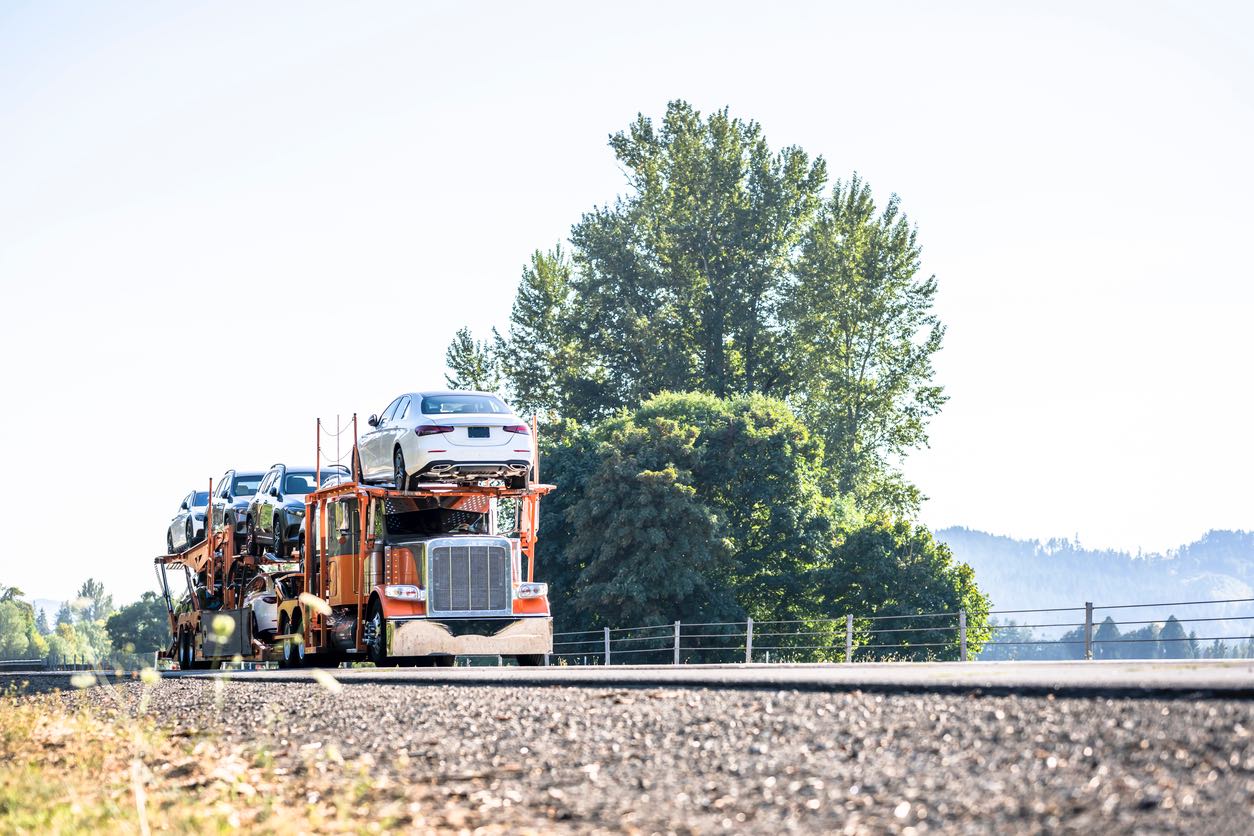Cross-country car shipping is more than just a logistical challenge; it’s a big financial commitment that requires careful preparation and careful research. Whether you’re shipping a treasured family automobile to a loved one, selling a car to an out-of-state buyer, or moving for a new career, the steps involved might be intimidating. Understanding the whole range of expenses associated with cross-country auto transport is crucial since every situation has different difficulties and financial ramifications. This first step is essential to preventing unforeseen costs and guaranteeing a seamless, stress-free shipping experience.
In this blog article, we will go deeper into the topic to attempt and explain the nuances of domestic cross-country auto shipping. This article aims to provide you with all the information you need by offering a thorough examination of the variables influencing shipping prices, from distance and carrier type to vehicle size and seasonal changes. Our mission is to turn what may sometimes seem like an impossible undertaking into a feasible and knowledgeable decision-making process, making sure you are ready for every facet of transporting your car across the nation.

For those who want to ship their car across the country, knowing how much it will cost is crucial while doing so. The average price might vary greatly; it usually falls between $510 and $1,850. This variance is mostly determined by the distance your car must go; longer trips often result in greater costs. For example, moving your car between adjacent states will usually be less expensive than transporting it from the East Coast to the West Coast. Additionally, keep in mind that these expenses are subject to change depending on carrier availability, fuel prices, and seasonal demand. For this reason, it is important to obtain up-to-date rates before making any decisions.
It’s helpful to examine the per-mile price structure in order to further break down the charges, since it offers a more thorough grasp of the associated costs. When traveling more than a thousand miles, the price usually ranges from $0.84 to $0.94 per mile. However, the charge may go up to $0.94 to $2.05 per mile for shorter journeys (less than 1000 miles). Longer journeys are often more economical per mile; this price model reflects the economies of scale in auto freight. Therefore, to get an exact cost estimate while shipping your automobile, take the complete route into account. Remember also that obtaining estimates from multiple shipping companies may assist you in locating the most affordable prices and guarantee that you’re receiving the ideal bargain for your wants about cross-country auto shipment.

Every automobile owner should take into consideration a number of elements that might considerably affect the cost of shipping a car across the nation. The distance your car will go is one of the most important criteria. It’s simple: shipping costs increase with the length of the trip. This is due to the fact that longer distances require more fuel, more driver time, and increased wear and tear on the transport vehicle, all of which raise the overall cost. The route chosen may also have an impact on the cost because different areas or routes may have variable fuel costs or higher tolls.
The type of carrier that is utilized for transportation is another important consideration. Open carriers and enclosed carriers are the two choices that are often available. Although they can carry many automobiles at once and are more affordable, open carriers expose the vehicles to the weather and road debris. On the other hand, enclosed carriers provide your car with more protection by keeping it out of the elements and out of the dirt. For this reason, they are the perfect option for brand new, high-end, luxury, or vintage automobiles. But the price for this extra security is more than it usually is when compared to open carriers.
When calculating the shipping cost, the size of the vehicle is another important factor. Bigger cars, including vans, SUVs, and pick-up trucks, use more fuel since they weigh more and take up more room on the carrier. Larger cars therefore often cost more to transport than standard-sized cars.
Finally, the cost may vary depending on the season you decide to transport your vehicle. Summertime and the first few months of the year are often the busiest times for auto transportation, which drives up costs. On the other hand, rates may be cheaper in the winter, unless there are routes that are impacted by bad weather, which might raise expenses because of longer delivery times and more risk.
You may more effectively plan and budget for your vehicle shipping requirements and make well-informed decisions to guarantee a seamless and economical transport experience if you are aware of these elements. Remember that obtaining estimates from several carriers and making advance plans might also assist you in obtaining the greatest cost feasible for your circumstances.

Making the right choice of carrier is crucial when shipping your car across the country. Open carriers and enclosed carriers are the two main choices. The more affordable and popular option, open carriers, are usually seen on highways moving many cars at once. There is a catch to this affordability, though: while in transportation, your car is open to the elements and flying debris. Many people consider this to be a risk that is acceptable, particularly when traveling shorter distances or in less valuable or vintage cars.
Enclosed carriers, on the other hand, provide your automobile more security by protecting it from the weather and other traffic dangers. This option is especially popular for brand new, high-end, classic, or luxury cars where extra security and protection are crucial. Even though it is more expensive than open carriers, the assurance and lower chance of damage frequently outweigh the cost. It’s important to strike a balance between the need for security and your budget; if your car represents a sizable investment, paying the additional money for enclosed transport may prove to be a prudent move. Keep in mind that when it comes to your important asset’s protection, the least expensive solution isn’t necessarily the best one.
It’s extremely important to take into account additional aspects while making your decision, such as the shipping distance, the time of year, and your vehicle’s particular needs. For instance, at busy times of the year, the price differential between covered and open carriers may decrease, favoring the latter. Additionally, if your vehicle has certain requirements or needs special handling, this may sway your choice in favor of a more customized transport option. In the end, selecting the best shipping solution ensures a successful and stress-free transit experience by striking a balance between cost, convenience, and the degree of care your automobile requires.

It doesn’t have to be difficult to ship an auto across the nation at a lower cost. It starts with a straightforward yet powerful tactic: adaptability. You may be able to negotiate cheaper prices if you’re flexible with your shipment timetable. Schedules and costs for several auto shipping businesses vary based on the number of their routes and the volume of vehicles they transport. You can receive a better rate if you time your shipping requirements to coincide with their slower times, which are usually midweek days or off-peak seasons. This flexibility helps your pocketbook as well as providing a wider range of carriers, which raises the likelihood that you’ll discover a dependable service at a reasonable cost.
A further important consideration is comparison shopping. Obtaining estimates from a few auto shipping companies is now simpler than ever in the internet age and is a step you shouldn’t miss. Examine every quote in depth, paying attention to more than just the price. Compare the kinds of services provided, the insurance that is provided, and any additional costs that may be incurred. In addition to guaranteeing that you receive the greatest deal, this comprehensive comparison helps you understand exactly what you’re paying for. Always keep in mind that sometimes the lowest priced choice isn’t the best. To be sure your car is in good hands, find a balance between price and service quality. In addition to saving money, you can provide peace of mind for your cross-country auto shipping needs by devoting time to research and comparison.

Knowing the importance of insurance and other costs while shipping your car across the nation is not only important, but also essential to making an informed choice. When it comes to shipping cars, insurance serves as a buffer, providing security and comfort against unforeseen damages or mishaps while in route. It’s vital to look into the specifics of the insurance coverage provided by most respectable auto shipping companies (both brokers and carriers), since most will include some level of coverage in their price. Ask questions such as: What kind of damages is it covering? Is a deductible required? The most crucial question is: Does the coverage match the market value of your car? Getting more insurance in some situations could be a smart move, particularly if you’re moving an brand new, expensive or classic car.
In addition to insurance, there are sometimes additional expenses that might impact the total cost of shipping your vehicle. Depending on the shipping provider and the particulars of your shipment requirements, these costs might differ significantly. Common extra costs include accelerated shipping costs if you need your automobile delivered sooner than the usual timeframe, and fuel surcharges, which might change in response to changes in gasoline prices.
Moreover, some companies may charge extra for specialized handling needed for particular cars or for supplementary services like door-to-door delivery. Asking for a detailed breakdown of the entire cost is crucial to make sure there are no unstated fees. Not only does this make precise budgeting easier, but it also helps to avoid unpleasant surprises when the final payment comes in.
Making decisions based on these factors will improve the auto shipping experience significantly. In terms of your car’s safety and security, keep in mind that the least expensive choice isn’t necessarily the best. Making an informed decision that strikes a balance between cost and peace of mind may be achieved by placing a high priority on openness and a full grasp of insurance and additional costs.

George’s auto transport—which cost about $1,550—from New York to California serves as an example of affordable auto transportation. Choosing to be an open carrier was a calculated risk that resulted in substantial cost savings. John was further benefited by his ability to be flexible with delivery dates, which let him take advantage of cheaper prices at a slower time of year. This actual case study demonstrates how selecting the appropriate carrier type and exercising flexibility in scheduling may result in significant cost savings. It’s evidence of how crucial it is to comprehend and take advantage of the factors under one’s control in order to efficiently manage shipping expenses.
Another example included a college student named Emily who needed to ship her tiny car from Texas to Florida. Because of her limited resources, she was searching for the most affordable choice. Emily chose a transport provider that would cost her about $750 and offered affordable rates for shorter routes after researching many transport companies. Her story highlights how shipping charges vary depending on the kind of vehicle and distance traveled. Emily’s story indicates that there are reasonable choices available for those who want to move their cars across shorter distances, particularly if the car in question is smaller or more compact. These examples operate as useful guidelines, showing how unique situations and well-informed decisions may affect the total cost of transporting an automobile across the country.

The entire process of shipping a car across the country involves a wide range of expenses and factors, all of which are important for your decision-making. It’s not just about going from point A to point B when you understand these different costs; it’s also about making decisions that fit your needs and budget. The goal of this guide is to shed light on the sometimes murky world of vehicle transportation by outlining the financial factors that may affect your experience. Every choice you make is a step closer to a customized shipping solution, whether you choose an enclosed carrier for increased security or an open carrier for cost-effectiveness.
In addition, this blog article is a thorough resource meant to provide you with information and ideas, not simply a basic instruction. We have made an effort to provide you with the knowledge required to make informed decisions by exploring the intricacies of per-mile expenses, seasonal variations, and the subtleties of different vehicle types. Equipped with such knowledge, one may make the difference between an unanticipated financial burden and a seamless experience in the ever-changing world of automobile shipping. Note that your auto shipping trip may be greatly streamlined by careful planning and a full awareness of these elements, making it a less intimidating and more doable undertaking.

The shipping partner you choose can have a significant impact on the process of transporting your car across the huge expanses of the United States. Ship A Car, Inc. (SAC) is an industry leader recognized for providing outstanding service and knowledge in cross-country auto shipping; they are not simply another participant in the logistics game. Selecting SAC means working with a business that takes great satisfaction in having a thorough grasp of every detail and complexity involved in nationwide auto transportation. Their staff has the know-how and abilities to manage any shipping situation, making sure that the transfer of your car from point A to point B is as easy and stress-free as possible.
Additionally, Ship A Car, Inc. distinguishes itself in an industry where customer happiness is of the utmost importance by providing exceptional customer service. They establish connections based on reliability and trust in addition to moving vehicles. Every customer receives individualized attention to ensure that every detail of the automobile shipping process is understood and catered to what they want and prefer. Selecting SAC means that you are choosing an auto shipping service that is not just effective and safe but also supported by an unmatched dedication to client satisfaction. Contact Ship A Car at (866) 821-4555 for a hassle-free auto shipping service that puts your requirements and peace of mind first, and start your smooth cross-country voyage right now.
Q: What is the most cost-effective method of transporting a vehicle across the country?
A: Generally speaking, an open carrier is the most cost-effective choice, particularly when traveling over greater distances.
Q: Is it possible to ship a car across the whole country in a reasonable amount of time?
A: Depending on the distance traveled and the type of route used, the time frame might be anything from one to two weeks.
Q: When it comes to shipping a car, are there any hidden costs?
A: To avoid unpleasant surprises, it is important to always inquire about additional expenses like as insurance or gasoline surcharges.




